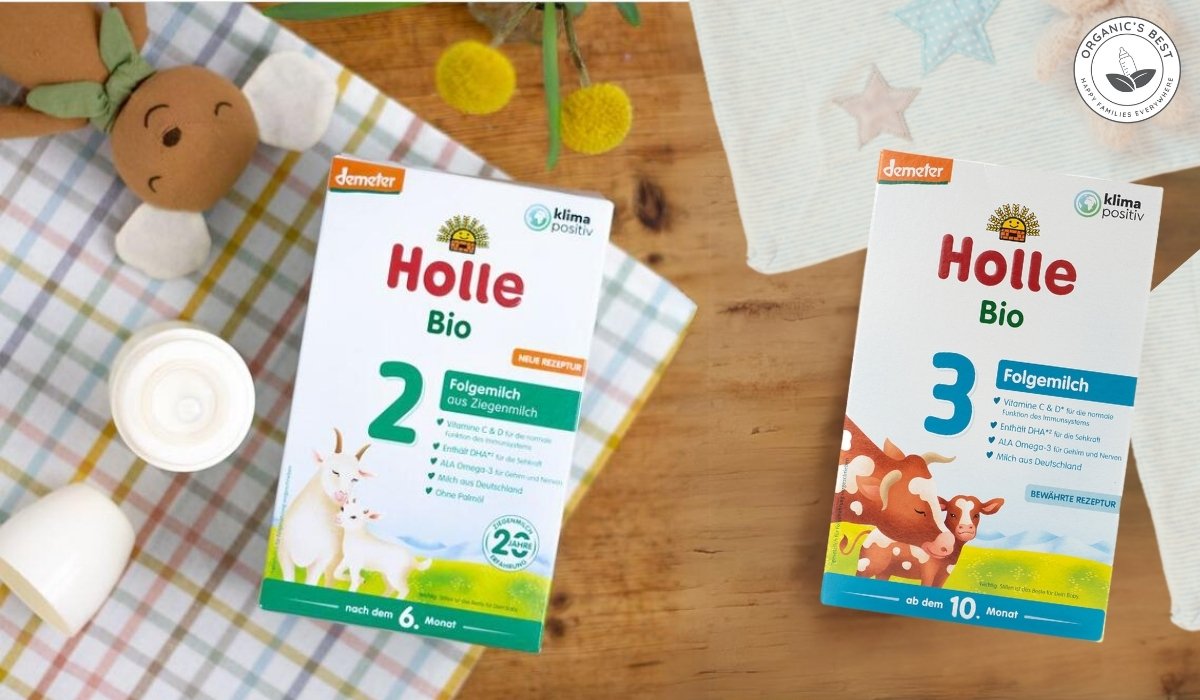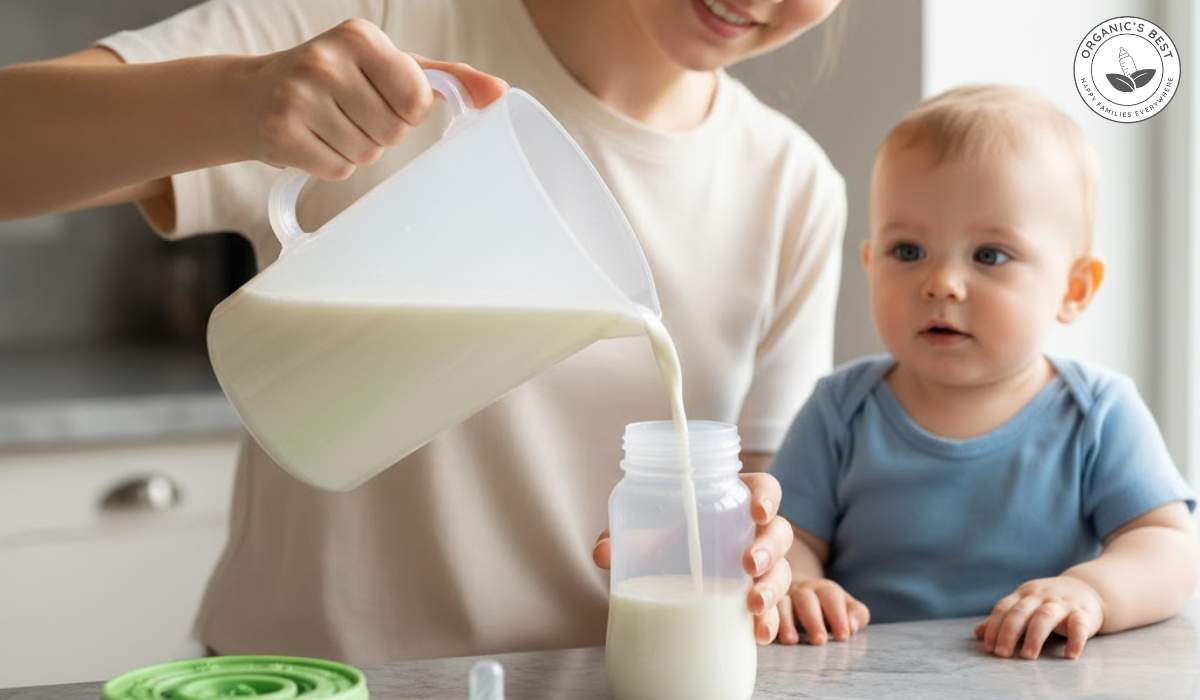Click to Get 2 FREE Boxes/Cans
Click to Get 2 FREE Boxes/Cans
Only New Customers! Click HERE to Get 2 Extra Boxes/Cans for Free With Your First Order.
Only New Customers! Click HERE to Get 2 Extra Boxes/Cans for Free With Your First Order.
BABY FORMULA
Offering new parents top-quality European infant formula from renowned brands like HiPP, Holle, Kendamil, and more. If you’re uncertain about which product to choose, our Formula Finder can help you make the best decision for your baby.
Baby Food
Offering new parents a premium selection of European baby foods, including jars, pouches, cereals, and snacks from esteemed brands like HiPP and Holle.
Holle Formula Ingredients: What Makes It a Top Choice
by Agustina Fernandez March 18, 2025 5 min read

Holle is a company that has been committed to the highest standards of infant nutrition for decades. What sets Holle apart is their unwavering dedication to organic and biodynamic farming.
This commitment ensures that Holle formula not only meets but often exceeds the stringent requirements for organic European infant formula, offering babies a nutritional foundation that is second to none.
In this article, we will discuss Holle formula ingredients and the principles of organic and biodynamic farming that underpin them, while touching on the importance of avoiding unnecessary additives in baby formula and how Holle achieves this!
Table of Contents
Why Holle Stands Out: Organic and Biodynamic Farming
While European organic certification is a significant achievement in itself that ensures top-quality clean ingredients, Holle goes above and beyond with their Demeter formulas, which satisfy the strictest organic standards globally. Let's dive deeper into what that Demeter certification means.
Demeter-Certification and Biodynamic Farming Explained
At the heart of Holle's commitment to exceptional infant nutrition lies in their partnership with Demeter-certified farms and the practice of biodynamic farming. Demeter International is a private organic certification organization that sets high standards for biodynamic agriculture.

Biodynamic farming is a sustainable and holistic approach to farming with a focus on maintaining the health of the soil, the well-being of animals, and the preservation of biodiversity.
The Advantages of Demeter Milk
One of the key components of the Holle cow's milk baby formula recipe is Demeter skim milk powder in Stages PRE to 3. Demeter cows are treated not just as sources of milk but instead as living beings integral to the farm's ecosystem.
This humane approach to animal husbandry resonates with parents who value ethical practices. Moreover, because dehorning of the cows is prohibited, they can produce more nutrient-rich milk with higher levels of omega fatty acids, vitamin E, and beta carotene!
Since Holle Cow Stage 4 is intended for toddlers from 12+ months, it does not qualify for Demeter certification but remains EU organic. Additionally, A2 cow's milk is not available in Demeter quality. Thus, Holle's A2 cow's milk line only has EU organic certification.
Unpacking Holle Formula Ingredients
Holle's formula range is available in three varieties: standard cow milk formula, A2 cow milk formula, and goat milk formula. Let's discuss the differences between Holle baby formulas next!
Holle Goat vs. Cow Milk Formulas
When it comes to formula, there is no one-size-fits-all solution. While most babies do well with cow's milk-based formulas, others can tolerate goat's milk more easily. For this reason, Holle has formulas based on both types of milk. Their standard cow's milk formulas are great for babies without feeding sensitivities, and Holle goat and A2 cow's milk ranges offer a gentler alternative.
You may be unfamiliar with Holle's unique A2 formulas. In this range, recipes are crafted with a base of EU organic milk from specially selected cows that naturally produce only A2 proteins in their milk. This is beneficial for babies because, during digestion, A2 milk doesn't release the peptide BCM-7, which can cause discomfort for some infants!
Learn more: Holle Cow vs Goat Formula Comparison
Macronutrients: Healthy Fats and Carbohydrates
Holle's nourishing blends consist of a carefully curated selection of ingredients, including a mixture of organic vegetable oils like sustainably sourced organic palm oil, organic sunflower oil, and organic rapeseed oil.
As for omega fatty acids, Holle uniquely uses plant-based DHA (omega-3) from algae and ARA (omega-6) from Mortierella Alpina oil. DHA and ARA are beneficial for supporting healthy cognitive development in infants.
Finally, Holle formulas draw most of their carbohydrate content from organic lactose. However, starting from Stage 2, you may find organic maltodextrin and organic starch on the ingredients list. These complementary carbohydrates help your baby feel full for longer and enhance the milk's consistency. However, the specific carbohydrates used vary between product ranges and stages.
Micronutrients: Vitamins and Minerals
For balanced nutrition, Holle organic formula provides a host of vital micronutrients, including vitamin D, vitamin K, vitamin C, vitamin E, folic acid, sodium chloride, calcium carbonate, and potassium chloride that are important to babies' overall well-being.
Here are the specific ways these nutritional powerhouses work to support your little one's growth and development:
-
Vitamin C is essential for immune function.
-
Vitamin E protects cell health and supports various bodily functions.
-
Vitamin K is crucial for blood clotting and bone health.
-
Vitamin D is vital for calcium absorption and bone development.
-
Folic Acid is foundational to the production of genetic material (DNA and RNA) and is particularly important for tissues and cells undergoing rapid growth.
-
Pantothenic Acid (Vitamin B5) is involved in energy production and hormone synthesis.
-
Zinc Sulfate supports immune function and wound healing.
What Ingredients You Don't Find in Holle Formula
As important as it is to include clean, nourishing ingredients in infant formula, it is also beneficial to leave out unnecessary ingredients that don't fully support a baby's well-being. Here's a closer look at what Holle ditches in their organic baby formula recipes.

No Artificial Ingredients
Holle is meticulously crafted without artificial flavors, colors, or preservatives. Unlike some conventional baby formulas, you won't find these artificial additives in Holle's products.
No GMOs
Genetically modified organisms (GMOs) have been a subject of concern for many consumers. Holle shares these concerns and has made a resolute commitment to being GMO-free, as indicated by Holle's Demeter and EU organic certifications.
No Added Sugars
Added sugars in formula can have adverse health consequences for babies and toddlers. Holle takes a strong stance against including unhealthy sweeteners in their formulas. Instead, Holle relies primarily on the natural, mild sweetness of organic lactose to provide a gentle and wholesome source of carbohydrates for growing babies!
FAQs on Holle Baby Formula Ingredients
To help deepen your understanding of Holle formulas, we've prepared a brief FAQ section for quick reference.
What Are the Ingredients in Holle Infant Formula?
Holle infant formulas offer a complete source of nutrition to newborns from birth. Holle offers several varieties of infant formula, including cow's milk, A2 cow's milk, and goat's milk. All Holle Stage PRE and Holle Stage 1 infant formulas use lactose as the exclusive carbohydrate source and are formulated to mirror breast milk closely.
What Are the Ingredients in Holle Stage 2?
Holle Stage 2 follow-on formula is designed for babies from 6+ months once they've transitioned to a mixed diet. In addition to lactose, most Holle Stage 2 formulas include organic starch and maltodextrin for a more robust carbohydrate profile. However, there are also lactose-only options, such as Holle Goat Global Stage 2. Stage 2 formulas are fortified with higher levels of iron, vitamin D, and vitamin C to better support your growing baby's dietary needs.
Why is Holle Formula Not FDA-approved?
European baby formulas aren't FDA-approved primarily because only European regulatory bodies control them, and they are generally not subject to the FDA's approval process. Despite this, European infant formulas abide by stringent regulations, ensuring top-tier quality for your precious little one!
Conclusion
Holle is a trusted companion for parents who value the highest infant nutrition standards. The brand's commitment to organic and biodynamic principles, avoidance of unnecessary additives, and inclusion of essential nutrients make it a top choice among health-conscious parents!
|
Disclaimer: Please be aware that this information is based on general trends in babies, and it is not medical advice. Your doctor should be your first source of information and advice when considering any changes to your child's formula and when choosing your child's formula. Always consult your pediatrician before making any decisions about your child's diet or if you notice any changes in your child. Breastfeeding is the best nutrition for your baby because breast milk provides your child with all the essential nutrients they need for growth and development. Please consult your pediatrician if your child requires supplemental feeding. |
Agustina Fernandez
Dr. Agustina Fernandez earned her medical degree from the prestigious Universidad Nacional de Córdoba, Argentina. With a deep-rooted passion for pediatrics, Dr. Fernandez is currently on the path to specializing in children's healthcare. Recently, she has delved into the vital field of infant nutrition. Her research interests include breastfeeding, infant formula, and baby food in little ones’ formative years. Dr. Fernandez's commitment to this area of study underscores her dedication to ensuring the health and well-being of children from their earliest days.
Leave a comment
Comments will be approved before showing up.
Also in Organic Infant Nutrition and Health Blog

Can You Bring Baby Food Pouches on a Plane? Essential Tips for Parents
by Agustina Fernandez December 09, 2025 7 min read
Read More
The Formula Pitcher: Is It Safe To Make A Whole Pitcher Of Baby Formula?
by Agustina Fernandez December 02, 2025 8 min read
Read More
How to Dress Baby in Winter for Comfort and Warmth
by Agustina Fernandez November 25, 2025 8 min read
Read More
Reviewed by Dr. Bardha Citaku, MD
-

Dr. Bardha Citaku: Medical Reviewer of Organic's Best Blog
Dr. Bardha Citaku completed her medical studies at the University of Prishtina in Kosovo, where she began her journey into the field of medicine. She has since developed a career in medical research, contributing to projects with notable organizations, including the World Health Organization (WHO).
